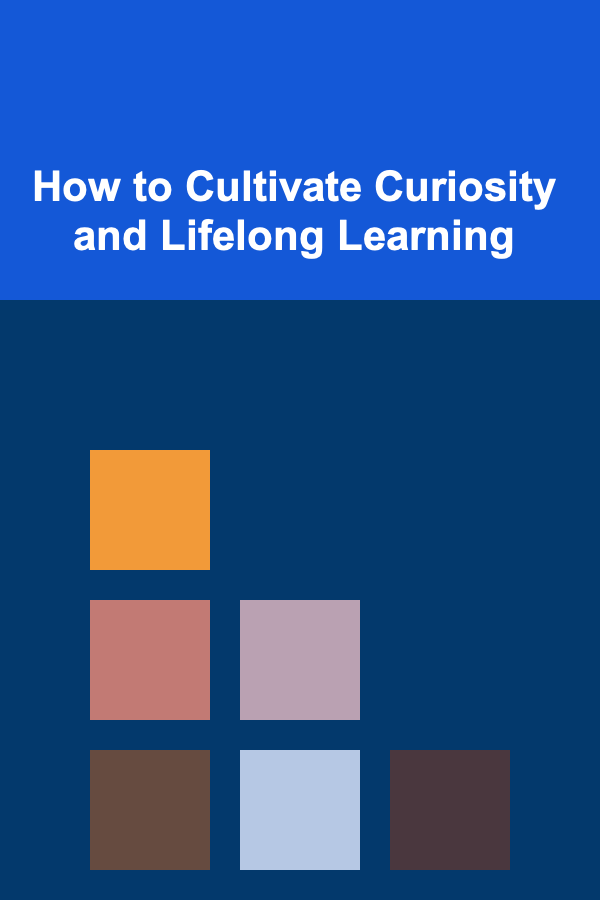
How to Cultivate Curiosity and Lifelong Learning
ebook include PDF & Audio bundle (Micro Guide)
$12.99$9.99
Limited Time Offer! Order within the next:

Curiosity is the engine that drives discovery, innovation, and personal growth. It is the spark that fuels our quest for knowledge, pushing us to ask questions, seek answers, and explore the world around us. Cultivating curiosity not only enriches our lives but also sets the foundation for lifelong learning, ensuring that we continue to grow, adapt, and thrive in an ever-changing world. In this article, we will explore the nature of curiosity, its importance, and practical strategies for nurturing both curiosity and lifelong learning.
The Nature of Curiosity
Curiosity is an innate human trait that manifests as a desire to know more, to explore, and to understand. It is the fundamental drive behind inquiry and discovery, playing a critical role in both intellectual and personal development. Curiosity is not limited to specific subjects or areas of interest; it is a broad and universal trait that can be applied to virtually any aspect of life.
There are different types of curiosity. Some of the most notable include:
- Epistemic Curiosity: This type of curiosity is focused on acquiring knowledge. It involves the desire to understand how things work, explore new ideas, and discover new facts.
- Perceptual Curiosity: This curiosity arises from a need to explore the unknown or unfamiliar, often driven by sensory experiences. It can be seen when people seek out new experiences to satisfy their natural instinct to understand their environment.
- Diversive Curiosity: Diversive curiosity refers to the desire to break from routine and experience new things. This form of curiosity is often driven by the need for novelty and variety in one's life.
- Integrative Curiosity: Integrative curiosity goes deeper, driving individuals to seek connections and find meaning between different pieces of information. It is the desire to integrate new knowledge into existing frameworks and understand how it fits into the bigger picture.
While curiosity is a natural trait, it can vary from person to person, and its intensity can fluctuate depending on one's environment, experiences, and mindset. The key to fostering lifelong learning lies in cultivating and nurturing this innate curiosity throughout one's life.
The Importance of Curiosity in Lifelong Learning
Lifelong learning is the continuous, self-motivated pursuit of knowledge for personal or professional development. It is an ongoing process of acquiring skills, knowledge, and experiences that contribute to personal growth and a deeper understanding of the world. Curiosity is at the heart of lifelong learning because it drives the desire to learn and grow throughout life.
Here are several reasons why cultivating curiosity is vital to lifelong learning:
1. Fosters a Growth Mindset
A growth mindset is the belief that abilities and intelligence can be developed through hard work, perseverance, and dedication. Curiosity is a key component of this mindset because it promotes the idea that there is always more to learn and discover. When you approach the world with curiosity, you view challenges as opportunities for growth rather than obstacles. This attitude fosters resilience, adaptability, and a willingness to keep learning, even in the face of difficulties.
2. Encourages Adaptability
In today's fast-paced, ever-changing world, adaptability is crucial for success. Curiosity encourages individuals to stay open-minded and embrace new ideas and experiences. By being curious, you are more likely to stay informed about new developments in your field, technology, and culture, enabling you to adapt to changes and stay relevant. Lifelong learners who cultivate curiosity are better equipped to navigate uncertainty and change with confidence and flexibility.
3. Promotes Critical Thinking
Curiosity drives individuals to ask questions, challenge assumptions, and seek evidence. This habit of inquiry is essential for critical thinking, which involves analyzing information, evaluating different perspectives, and making informed decisions. By cultivating curiosity, individuals are more likely to develop their analytical and problem-solving skills, which are crucial for both personal and professional growth.
4. Deepens Understanding and Retention
When we approach learning with curiosity, we are more likely to engage deeply with the material. Rather than simply memorizing facts or completing tasks, curious learners actively seek to understand the underlying concepts and principles. This deeper engagement enhances retention and helps individuals retain knowledge for longer periods of time, making learning more meaningful and impactful.
5. Increases Motivation
Curiosity naturally fuels motivation. When we are genuinely interested in a subject, we are more likely to invest time and effort into learning about it. This intrinsic motivation is more powerful and sustainable than external motivators like grades or rewards. Cultivating curiosity ensures that learning becomes a lifelong pursuit driven by passion, rather than a temporary task or obligation.
How to Cultivate Curiosity
Cultivating curiosity requires intention and effort, especially in an age of distractions and information overload. Here are some practical strategies to foster and nurture curiosity:
1. Ask More Questions
The act of asking questions is one of the most fundamental ways to cultivate curiosity. Rather than accepting things at face value, challenge yourself to ask "why," "how," and "what if" questions. These questions spark new avenues of exploration and encourage you to dig deeper into the topics that interest you. Start by questioning the things you encounter daily --- from the news to your personal experiences --- and look for ways to uncover new insights.
2. Explore Different Perspectives
Curiosity thrives when we expose ourselves to new ideas and perspectives. One of the best ways to broaden your horizons is by engaging with people who have different viewpoints, backgrounds, and experiences. Whether through travel, reading, or conversations with others, exploring different perspectives helps you see the world in new ways and challenges your assumptions. By remaining open-minded, you will continually find new sources of inspiration and motivation for learning.
3. Embrace Uncertainty and Discomfort
Curiosity often leads us into the unknown. It is natural to feel uncomfortable or uncertain when exploring unfamiliar topics or ideas. However, it is precisely in this discomfort that growth occurs. Instead of avoiding things that seem difficult or intimidating, embrace them as opportunities to learn and grow. Understand that making mistakes and encountering setbacks is part of the learning process, and view them as valuable lessons rather than failures.
4. Pursue Passion Projects
When we are genuinely passionate about something, curiosity flows naturally. Identify topics or activities that excite you and pursue them with enthusiasm. This could be anything from learning a new language to delving into a specific area of study or developing a new skill. Passion-driven curiosity is often the most sustainable because it is rooted in genuine interest rather than obligation. By prioritizing passion projects, you will fuel your lifelong learning journey.
5. Create a Learning Environment
To cultivate curiosity, it is important to create an environment that supports learning and exploration. This could involve setting aside dedicated time for reading, researching, or experimenting with new ideas. Surround yourself with resources that stimulate your curiosity, such as books, documentaries, podcasts, and online courses. Additionally, seek out a community of like-minded individuals who share your interests and can offer support and inspiration.
6. Stay Open to New Experiences
Curiosity flourishes when we expose ourselves to new experiences. Whether it's trying a new hobby, traveling to a new place, or stepping out of your comfort zone in some other way, new experiences stimulate our curiosity and help us learn. Don't be afraid to try something unfamiliar or take risks --- these experiences often lead to the most valuable insights and discoveries.
7. Practice Reflective Thinking
Reflection is a powerful tool for deepening curiosity and enhancing learning. After encountering new information or completing a learning activity, take time to reflect on what you have learned. Consider how it connects to other knowledge, how it changes your perspective, and how you can apply it in the future. This reflective practice encourages deeper understanding and helps solidify the knowledge you acquire.
8. Make Learning Fun
Curiosity is often stifled when learning feels like a chore. To keep your curiosity alive, find ways to make learning enjoyable and engaging. This could involve using gamification techniques, setting personal challenges, or turning learning into a social activity. When learning is fun and rewarding, it becomes something you look forward to, rather than something you feel forced to do.
Conclusion
Curiosity is the foundation of lifelong learning. It is the key to staying engaged, motivated, and open to new possibilities in life. By cultivating curiosity and adopting a mindset of lifelong learning, we can continue to grow, adapt, and thrive throughout our lives. Whether through asking questions, exploring new perspectives, or embracing discomfort, curiosity allows us to continuously evolve and enrich our understanding of the world. By fostering this innate trait, we can ensure that we never stop learning, no matter where life takes us.

How to Make Money by Developing AI-Powered Applications
Read More
How to Use Labels for Different Sections in Your Library
Read More
How to Use Social Media Management Tools to Make Money
Read More
How to Use Technology for Remote Property Management
Read More
How To Understand the Theory of Relativity (Astronomy Context)
Read More
10 Tips for Improving Communication with Carriers and Customers
Read MoreOther Products

How to Make Money by Developing AI-Powered Applications
Read More
How to Use Labels for Different Sections in Your Library
Read More
How to Use Social Media Management Tools to Make Money
Read More
How to Use Technology for Remote Property Management
Read More
How To Understand the Theory of Relativity (Astronomy Context)
Read More